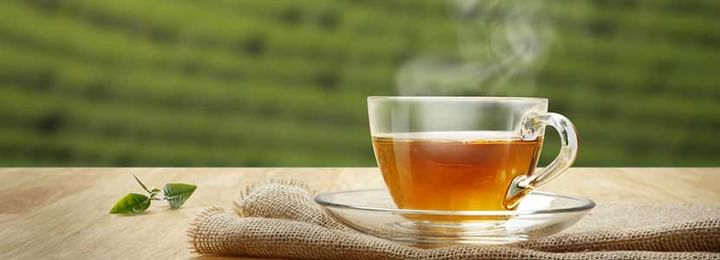Benefits of Tea And Its Side Effects
Last Updated: Jan 20, 2025
Tea is a rich source of anti oxidants whose primary function is to counter free radicals which are the main cause of chronic diseases. It is packed with phytonutrients and is almost free from calorie and caffeine. Among other important minerals it contains potassium and sodium. L theanine found in some tea create a calmer but more alert state of mind and boost your mental health.
Tea
Tea leaves come from the camellia sinensis plant which can be categorized into four major heads, white tea, black tea, green tea and oolong tea. All the four categories only differ in terms of fermentation process and the extent to which they are oxidized. The preparation of the tea also varies from place to place with serving options such as milk tea, black tea, lemon tea or ice tea.
Nutritional Value of Tea
Tea is a very rich source of anti oxidants especially polyphenol in some category. It is totally caffeine free and have almost zero calories. Different categories are enriched with different minerals such as vitamin A, vitamin C, calcium, potassium, copper, manganese, zinc and magnesium. Some categories have vitamin B,E,K along with folic acid, niacinamide and alpha hydroxyl acids.
Nutritional facts Per 100 grams
Vitamins and Minerals
Health Benefits of Tea
Anti inflammatory
Anti inflammatory
The presence of polyphenolic compounds such as aspalathin and nothofagin, that posses anti-inflammatory, antiviral and antimutagenic properties making tea a natural anti oxidant. It not only destroys and neutralize free radicals but also provide a boost to the immunity making it diseases tolerant.
Boost mental health
Control Diabetes
The presence of anti-oxidants that comes from polyphenol regulates the amount of blood sugar and insulin in the bloodstream which reduces the risk of uncertain dips and spikes in blood sugar that could prove fatal for diabetic patient. It also reduces blood glucose to a healthy level and is also used as additional medicine for type 2 diabetes.
Fight obesity
The presence of polyphenolic compound in tea is the primary source for weight reduction. It controls the metabolism of the body fat and also activates certain enzymes, thereby enhancing the functions of fat cells which in turn reduces obesity.
Healthier heart
Quercetin found in the some tea is a very powerful anti oxidant that is immensely potent in preventing a wide variety of heart diseases. Its anti inflammatory properties not only reduces blood pressure and destroys free radicals but also promotes an increase in HDL (good cholesterol) and inhibits LDL (bad cholesterol) from binding to the walls of blood vessels and arteries.
Prevents Cancer
Since Tea is a natural anti- oxidant, it is very rich in anti cancer properties. Moreover the polyphenolic compound act as chemo-preventive instrument against the development of cancer cells. Thus tea helps in reducing the risks of cancer and is very effective especially against ovarian and skin cancer.
Skin Problems
Some category of tea especially the less oxidized one is a boon for people with skin diseases. The presence of anti-oxidants removes the free radicals present in our body which is the root cause for majority of skin problems. Tea helps in exfoliation and slows down the oxidation of cells, giving you a much healthier skin. It also helps in anti ageing, wrinkles and dark spot reduction.
Improve bone health
Tea has a very high content of calcium, manganese and fluoride minerals which all are directly proportional to strong bones and teeth. Calcium is the main component of bone formation. By increasing the bio-availability of minerals, rooibos tea helps you in fighting common bone problems such as joint pain, osteoporosis and arthritis. Manganese is very useful in repairing bone damage and building bone mass. And fluoride is used widely in dental world as a cure for teeth problems.
Helps in hydration
Caffeine beverages are known to dehydrate you more than they hydrate if consumed in excess. Since tea is free from caffeine or have negligible amount it is actually healthy for you to drink tea for hydration at the same time provide you with necessary anti oxidants.
Uses of Tea
Tea is the most ancient and widely used beverage across the globe. Different regions have been preparing and using tea since 6000 B.C. Tea as a beverage is prepared in different method namely black tea, milk tea, lemon tea and ice tea. Certain types of tea such as Oolong tea and green tea is used for its medicinal properties as well as applied topically for curing skin diseases.
Side-Effects & Allergies of Tea
There is negligible or no side effects of consuming tea in moderate consumption. However excessive consumption of some tea like black tea which has amount of caffeine may lead to some health problems ranging from severe to mild headaches, nervousness, sleep problem, irritability, diarrhea, vomiting, heartbeat fluctuation, heartburn, dizziness, tremor, ringing in the ears, convulsions and confusions.
Cultivation of Tea
The origin of tea is wide, complex and debatable one spreading across the globe. However the plant Camellia sinensis is native to south east asia and according to a medical text written by Hau Tuo it likely originated in china during the Shangh Dynasty as a medicinal drink.Most part of the world is now growing its own tea as it require hot and humid climate. However it grows best on well drained fertile acid soilon high lands.
References
- Hara Y. Green tea: health benefits and applications. CRC press; 2001 Feb 2. [Cited 26 June 2019]. Available from:
- da Silva Pinto M. Tea: A new perspective on health benefits. Food research international. 2013 Oct 1;53(2):558-67. [Cited 26 June 2019]. Available from:
- McKay DL, Blumberg JB. The role of tea in human health: an update. Journal of the American College of Nutrition. 2002 Feb 1;21(1):1-3. [Cited 26 June 2019]. Available from:
Table of content
Ask a free question
Get FREE multiple opinions from Doctors



